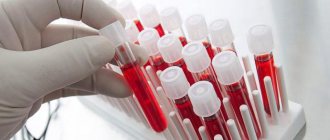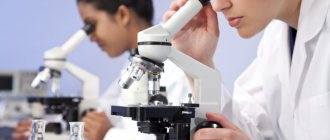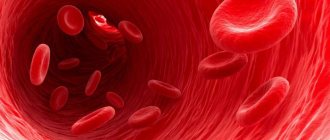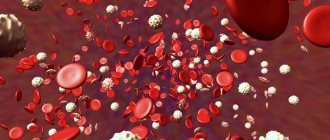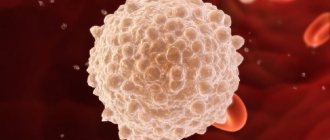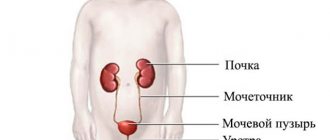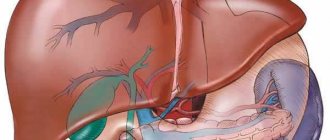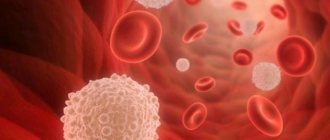Menopause is a natural process of attenuation of reproductive function in every woman, associated with a decrease in the amount of hormones produced in the body. For each representative of the fair sex, such hormonal changes are accompanied by various symptoms, but in any case there is a deterioration in the general condition and an exacerbation of pre-existing chronic diseases. Since the level of hormones changes significantly during menopause, the easiest way to make sure that menopause has really begun is by taking the appropriate tests.
In this article, we will describe exactly what hormones a woman needs to take for tests during menopause in order to verify its onset and select the appropriate medications to alleviate the symptoms of this period.
Why get tested?
All manifestations of menopause in women by the age of 50 are associated exclusively with hormonal disorders caused by the withering of the reproductive function of the female body. But the absence of menstruation is not always a sign of the onset of menopause; in order to determine the cause of one or another symptom, it is necessary to monitor the level of sex hormones in the blood. Women during menopause have precise norms, by comparing them with research results, appropriate conclusions can be drawn.
Based on the results of hormone tests, a gynecologist can prescribe hormone replacement therapy and thereby significantly alleviate the symptoms of menopause for a woman.
Luteinizing hormone
Affects the amount of estrogen in the body. In women, LH is involved in egg maturation and ovulation. The amount of LH fluctuates throughout the cycle. Its peak occurs in the middle of the cycle, when ovulation occurs. An increase in LH also occurs during menopause.
As a rule, a blood test for this hormone is prescribed to explain the occurrence of such phenomena as:
- decreased libido;
- frigidity;
- infertility;
- dysmenorrhea;
- dysfunctional uterine bleeding;
- inflammatory processes in the appendages;
- premature birth or termination of pregnancy;
- too early or late puberty.
When is laboratory diagnostics necessary?
Laboratory diagnostics should be carried out at the stage of premenopause, when the symptoms of menopause are not clearly expressed, but the first changes in the functioning of the body have already begun. Hormone tests during menopause can provide all the information about these changes.
You should go to a gynecologist and get tested for female hormones during menopause if the following symptoms appear:
- irregular periods;
- unexpected bleeding from the uterus;
- severe joint pain;
- dizziness, general weakness and headaches;
- abnormal vaginal discharge;
- hot flashes and increased sweating.
How to donate blood for female sex hormones
For the research, blood is drawn from a vein. The procedure is carried out by a clinical laboratory nurse.
Biological material must be taken on an empty stomach, so you must come for the study from 8.00 to 11.00 in the morning.
While menstruation continues, the amount of female sex hormones produced depends on the phase of the cycle. Therefore, to accurately determine different indicators, studies must be carried out on different days.
When to donate blood for female hormones? It is recommended to submit research material within the following deadlines:
- from the 3rd to the 5th day of the menstrual cycle, blood is drawn to study follicle-stimulating hormone (FSH), prolactin, estradiol and luteinizing hormone (LH);
- From the 20th to the 22nd day from the start of menstruation, you need to do a progesterone test.
If the duration of the menstrual cycle changes, the attending physician may prescribe hormonal tests on other days. With the complete cessation of menstruation - amenorrhea - blood can be donated for female sex hormones on any day.
What changes occur in the production of hormones
For each woman, her own personal level of progesterone, estradiol, prolactin and other hormones is normal, and hormonal imbalance is accompanied by a significant deviation from their normal value.
Female hormones during menopause, or rather changes in their levels, lead to the following changes in the body:
- decreased testosterone leads to the accumulation of fat in the chest and abdomen, as well as decreased bone density. The normal level of this hormone in the blood is 70 ng/dl; during menopause, the level drops to 40 ng/dl;
- estradiol during menopause can fluctuate in the range of 9.7-82 pg/ml;
- Progesterone level allows you to assess the condition of the uterus. Its norm is 0.64 nmol/l. Problems with the production of progesterone lead to disruptions in the menstrual cycle;
- Prolactin decreases significantly during menopause, but changes in the level of this hormone do not have any special symptoms. Its norm at this time should be 25-400 mU/l. Prolactin levels decrease annually;
- the level of LH and FSH with the onset of menopause increases 5-fold and is about 40 mIU/ml.
When to donate blood for female hormones
The signal to contact a doctor for a referral for a laboratory blood test is the appearance of various symptoms indicating the onset of age-related changes in the woman’s reproductive system. These signs include:
- increased sweating;
- changes in thermoregulation, so-called. "tides";
- frequent causeless mood swings;
- changes in body weight;
- dryness of the vaginal mucosa;
- decreased sexual desire;
- changes in the structure of hair and nails.
At different stages of menopause development, their characteristic symptoms appear. So, in the premenopausal phase, in addition to these signs, headaches become more frequent. During menopause, it is dangerous for the development of a number of serious diseases of the cardiovascular and endocrine systems. If menstruation is absent for a year or more, then we are talking about postmenopause, when unpleasant symptoms gradually disappear.
The body's response to hormonal changes
The most important process in the female body is metabolism, which is controlled by hormones. Various systems of the body take part in it, but its main task is to supply nutrients to various tissues, which ensures the normal functioning of the entire organism as a whole.
During menopause, hormonal levels change significantly, and these changes primarily negatively affect metabolism. Depending on the individual characteristics of the female body, signs of these changes may appear more or less pronounced, but almost every woman will experience the following body reactions:
- The level of female sex hormones decreases, and this affects not only the ability to conceive a child, but also the activity of the brain. The work schedule of some of its areas changes, and in particular the pituitary gland and hypothalamus, which take part in the production of sex hormones. Due to changes in the circulatory system of the upper body, there may be hot flashes in the face, neck and décolleté, dizziness, nausea, increased sweating and sudden changes in pressure;
- the balance of minerals in the body is also disturbed, which entails a decrease in the density of bone tissue and teeth;
- a reduced amount of hormones during menopause leads to problems with the thyroid gland, the production of thyroxine, which increases anxiety and increases the heart rate, is no longer suppressed;
- sex hormones are also responsible for the normal functioning of the adrenal glands; during menopause, hormonal disorders lead to malfunctions of this organ and, as a result, cause increased blood pressure and heart pain;
- hormonal changes also affect the functioning of the central nervous system, causing unreasonable fears, irritability, tearfulness and mood swings.
General information about menopause
Menopause or menopause is a normal physiological phenomenon, which is accompanied by an irreversible decline in ovarian function and hormonal changes. The average age of its onset is from 45 to 55 years. The process of maturation of eggs in a woman stops, and therefore menstruation no longer occurs.
Once menopause begins, a woman is no longer fertile. The level of sex hormones is sharply reduced or completely reduced to zero.
It is worth highlighting the gradual onset of menopause. Starting at age 30, progesterone and steroid estrogen levels decrease compared to younger ages. Ovulation becomes unstable and fewer eggs mature. The likelihood of pregnancy is slightly reduced.
The severity of hormonal changes increases by the age of 40. Ovulation and menstruation become irregular, and the volume of menstrual flow decreases. There are cases where a woman’s regular periods continue until the onset of menopause. However, such cases are the exception. A woman’s ability to conceive at this stage is minimized.
The main signs of the imminent onset of menopause include:
- irregular menstrual cycle;
- violation of thermoregulation;
- sensation of so-called “hot flashes”, when a woman feels intense heat in various parts of the body;
- increased sweating;
- decreased sexual activity;
- abdominal obesity (in the abdomen);
- reduction in the volume of mammary glands;
- hair loss or thinning;
- urinary incontinence;
- psycho-emotional deviations from the norm: increased irritability and aggression, sudden mood swings, apathy and depression, as well as sleep disturbances.
Artificial menopause
The onset of menopause may be a consequence of the influence of external factors. During a course of chemotherapy or radiation therapy, a woman may notice the first signs of early menopause.
With ovarian failure, an early onset of menopause is also observed. In this case, the ovaries do not stop secreting hormones completely, but synthesize them in smaller quantities. The cause of this condition is autoimmune diseases, in which the human immune system begins to produce protective immunoglobulins against its own cells and tissues.
Artificial menopause occurs after surgical removal of the internal genital organs for medical reasons.
Why is it important to monitor hormonal levels during menopause?
Changes in hormonal status towards a natural decrease in sex hormones can affect a woman’s health. At the same time, there is not only an exacerbation of chronic diseases, but also the manifestation of new pathologies.
From the cardiovascular system, the greatest danger is thrombosis, severe atherosclerosis, and arterial hypertension. The risk increases due to a decrease in estrogen levels, which normally prevent the accumulation of low-density lipoprotein (“bad” cholesterol). According to statistics, pathologies of the cardiovascular system are the most common cause of death.
During this period, women experience a decrease in bone density, which means that the likelihood of developing osteoporosis or fractures is high. In addition, the elasticity of the tissue changes and the woman may experience urinary incontinence.
It is important to ensure that hormones during menopause are within normal limits. Early correction of their deviations from acceptable values will significantly reduce the risk of developing the above diseases.
What tests need to be taken
Now let's look at what tests a woman needs to undergo during menopause:
- on the level of FSH in the blood. With the advent of menopause, the value of hormones produced by the ovaries decreases, and FSH increases. This analysis allows us to determine the presence of disturbances in the synthesis of estrogen;
- on estradiol levels. If the result is greatly reduced and differs significantly from the norm, then this not only may indicate the onset of menopause, but also means that there is a high risk of complications at this stage (osteoporosis, atherosclerosis may develop);
- to the LH level. If menopause has entered the active phase, the content of this hormone increases;
- to progesterone. Its content in the blood gradually decreases. And during the first 2-3 years of menopause, this hormone may be completely absent in a woman’s body.
A woman’s feelings during hormonal changes
Signs of the onset of menopause are not only hormonal suppression and cessation of menstrual flow, but also other phenomena:
- rushes of blood to the head and upper body, accompanied by fever;
- excessive sweating caused by changes in the amount of estrogen in the blood;
- surges in blood pressure, both associated with hot flashes and not;
- heart rhythm disturbances, most often observed with hot flashes;
- emotional instability due to the fact that due to a decrease in estrogen concentration, the synthesis of serotonin, the hormone of happiness, is disrupted and becomes abrupt;
- drying of the mucous membranes of the uterine and vaginal integuments;
- negative changes in the structure of the skin;
- urinary incontinence and painful urination due to dryness of the urinary organs;
- destruction of bone tissue caused by a decrease in mineral content in the body.
Hormone levels - interpretation of tests
If a woman does not move in medical circles, then test results will be an ordinary set of numbers and icons for her, especially if she has undergone many studies and has accumulated a whole stack of such printouts. It is best to consult a doctor for interpretation, but you can first assess whether this or that indicator is normal at home. You still cannot do without a visit to the doctor, because only a specialist can prescribe adequate treatment based on the test results.
For various hormones, the norm for women during menopause will be as follows:
- Prolactin should normally be 107-290 mcg/l;
- thyroid-stimulating substance, the norm will be 0.2-3.2 mIU/l, the value should not change much over time;
- follicle-stimulating hormone or FSH level should be 24-84 units, while the FSH norm is 54 units with a permissible fluctuation of 30 units. round trip;
- luteinizing hormone - on average, its level should be 43 units. with a permissible deviation of 30 units in both directions;
- Progesterone during menopause is quite difficult to determine. At this time, progesterone decreases to 1 nM/l;
- The intensity of symptoms during this period depends on the level of estrogen during menopause, so the doctor must prescribe an estradiol test. The permissible norm of estradiol in women during menopause is 8-82 units. The lower the value, the brighter the signs of menopause. If estradiol during menopause is above 82 units, this can accelerate the development of benign formations, kidney failure and provoke general fatigue.
The LH/FSH ratio is also quite informative for a specialist. This indicator is measured as a percentage and during menopause the value of the ratio of FSH and LH should be in the range of 0.35-0.75 units. The lower the value, the more severe the symptoms.
This is an approximate transcript of the tests; only a doctor can read the results accurately.
The meanings of the numbers as a result of the analyzes
For a person not knowledgeable in medicine, a printout of the results of a hormone test will be a set of numbers. Only a doctor can correctly assess the indicators of menopause and consider the period of development of a woman’s reproductive system to be menopausal. Having passed the tests, the woman comes to see the doctor, when he already has a complete picture of all the examinations, in order to talk substantively about treatment.
When receiving the values of indicators, the doctor pays attention to the following figures - the norms of substances in menopause:
- for prolactin the norm will be from 107 to 290 mcg/l;
- thyroid-stimulating substance has a norm of 0.2 to 3.2 mIU/l, and basically the level will not change;
- FSH during menopause will range from 24 to 84 units. (average 54 with a fluctuation of thirty units in both directions);
- luteinizing substance - average 43 units with the same permissible deviation as that of the follicle-stimulating substance;
- progesterone in menopause is practically not detected - its level decreases to 1 nM/l;
- estradiol - during menopause the level decreases and ranges from 50 to 133 pM/l.
Although the hormonal background during menopause changes dramatically, this does not mean that a woman needs to be discouraged and prepare for the aging of her body. The situation can be saved with the help of hormone replacement therapy, which will compensate for the necessary deficiency of hormonal substances and make the manifestations of menopause less noticeable.
Educational video on this topic:
https://youtu.be/MLhaL4t3IV0
Menopause is a natural process of attenuation of reproductive function in every woman, associated with a decrease in the amount of hormones produced in the body. For each representative of the fair sex, such hormonal changes are accompanied by various symptoms, but in any case there is a deterioration in the general condition and an exacerbation of pre-existing chronic diseases. Since the level of hormones changes significantly during menopause, the easiest way to make sure that menopause has really begun is by taking the appropriate tests.
In this article, we will describe exactly what hormones a woman needs to take for tests during menopause in order to verify its onset and select the appropriate medications to alleviate the symptoms of this period.
Rules for taking tests
To ensure that the results of hormone tests taken during menopause are as accurate as possible, you must follow the following rules:
- go to change hungry;
- the day before the collection, you should not overwork and subject your body to heavy physical activity;
- one day before the test, you should not smoke or drink alcohol, or have sex;
- avoid stress and any emotional shock;
- a couple of days before the test, you need to stop taking hormonal medications prescribed earlier. The exact date of discontinuation should be discussed with your doctor;
- if it is necessary to check the level of hormones over time, then the test should be taken in the same laboratory so that the same reagents and methods are used.
Health tips during menopause and menopause
Menopause, indeed, implies serious changes in the female body, however, this does not mean that you can forget about good health, femininity, sexuality and youth. To make your life even brighter and more eventful than before, we recommend following a few tips from doctors:
- A gynecologist is your best friend! It is recommended to regularly visit a doctor, conduct a gynecological examination, take a smear for microflora and cytology. All gynecological diseases must be treated on time! It is very important to visit a doctor at the first symptoms of menopause. The specialist will tell you what tests you need to take during menopause, how to treat, what to take, etc.
- Try to move more. Play sports, walk more, walk more.
- Doctors recommend that women after 45 years of age have regular sex life. This has a positive effect on a woman’s psycho-emotional background and is also beneficial for women’s health.
- Do Kegel exercises to strengthen your pelvic floor muscles.
- Eat a balanced diet so that your body does not need healthy vitamins and microelements.
A woman should not endure and suffer from the unpleasant symptoms of menopause; modern pharmacology allows us to solve these problems in the shortest possible time. To eliminate dryness in the intimate area, pain during sexual intercourse, decreased libido and other unpleasant manifestations of menopause, corrective hormonal therapy is required. In addition to oral tablets, topical medications containing estriol (an analogue of estrogen) work well. For example, according to reviews from the Internet, candles and Ovestin cream are popular among menopausal women.
- Cherry jam
- Complivit calcium d3
- How to choose a vacuum cleaner for your home

